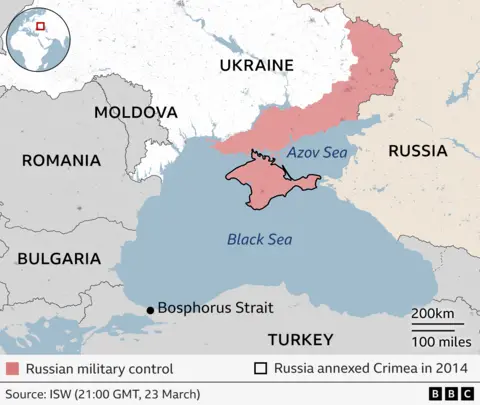Russia has said some Western sanctions must be lifted before it begins a maritime ceasefire with Ukraine.
Within hours of the US announcing the two sides had agreed to halt strikes in the Black Sea in separate deals, the Kremlin said it would only take place once sanctions on a number of Russian banks were lifted.
The demands include revoking sanctions on the state agricultural bank Rosselkhozbank and restoring the firms’ access to the Swift international payment system.
Overnight, Moscow launched a drone attack on the port city of Mykolaiv, Ukrainian officials said, with President Volodymyr Zelensky saying the strikes were “a clear signal” Russia did not want peace.
The aim was for Russian companies to lose access to the normal smooth and instant transactions provided by Swift, disrupting payments for its valuable energy and agricultural exports.
Reversing that decision would need EU approval, a step that would appear uncertain in light of recent European statements of support for Kyiv.
A European Commission spokesperson said the withdrawal of all Russian forces from Ukraine would be one of the main conditions to lift or amend any sanctions.
On Tuesday, US President Donald Trump said that Russia could be trying to delay ending the war.
“I think that Russia wants to see an end to it, but it could be they’re dragging their feet. I’ve done it over the years,” he said in an interview with Newsmax.
The maritime ceasefire was announced by the US after three days of peace talks in Saudi Arabia.
However Kyiv and Moscow later released conflicting statements on the details of the deal, including when and how it would start.
Zelensky said he believed the deal did not require sanctions relief to come into force and would take effect immediately.
He called the Kremlin’s statement an attempt to “manipulate” the deals.

Dr Jenny Mathers, a senior professor of international politics at Aberystwyth University and expert on Russian politics, said the maritime ceasefire would provide Russia with a “big advantage” as it was currently struggling to export its agricultural produce.
“Ukraine has managed to get out a lot of its agricultural produce through the Black Sea, and it’s managed to successfully target Russian shipping, so Russia doesn’t use the Black Sea at the moment,” Dr Mathers said.
The Black Sea Grain Initiative was struck in 2022, allowing safe passage of commercial ships travelling to and from Ukraine, with UN officials helping Russia get its food and fertiliser exports to foreign markets in return.
Russia withdrew from the agreement in summer 2023, arguing that financial sanctions were hindering its exports.
After announcing the agreement on Tuesday, Washington said all parties would continue working towards a “durable and lasting peace”, adding that the agreement would reopen an important trade route.
Ukraine and Russia also committed to “develop measures” to implement a previously agreed ban on attacking each other’s energy infrastructure, the White House said.
The Black Sea is located south of Ukraine and to the west of Russia, and is also bordered by Romania, Bulgaria, Turkey, and Georgia.
It is also bordered by parts of Russian-occupied Ukraine – including Crimea.
It is a vital shipping route for Ukrainian exports, and after Russia pulled out of the grain deal in 2023, it said it would view any vessel bound for Ukraine as a potential military target.
Ukraine’s grain exports slumped as a result, but later rebounded to near pre-war levels as Kyiv established new export routes.
BBC






